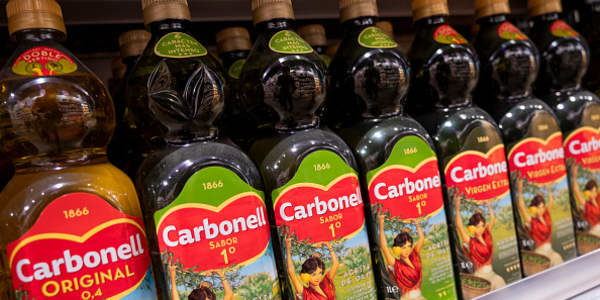Tesla has a lot going on. A significant slump in sales, stoking concerns among investors and industry analysts, in an EV market where aggressive price cuts have been needed to spur demand, have tied into decisions made by Elon Musk's company to lay off workers and scale back spending on its EV Supercharger network. Tesla's stock price has declined by over 30% this year.
Then, there's the whole trade war with China, in which Musk holds a unique position.
The U.S. government is determined to limit China's ability to, as it says, "flood" the U.S. market with renewable energy products, including its rapidly growing supply of EVs, with models priced as low as $10,000. But Tesla has a major operation in China, similar in some ways to Apple, a market key to both its manufacturing and consumer demand. That has all put Musk under considerable pressure to unlock new growth frontiers while navigating challenges of increased competition, supply chain disruptions, and rising raw material costs.
The EV giant appears is paying more attention to the vast potential of Asia beyond China, one of the hottest EV markets. In addition to its well-known interest in India, Tesla is taking a closer look at Thailand, the EV capital of Southeast Asia, where green mobility is rapidly gaining traction.
Thai government officials have touted talks with Tesla as Musk scouts locations for the next gigafactory — Thailand has been part of those deliberations for a few years, as has India, where Musk was scheduled to pay a recent visit before he canceled it, citing issues at Tesla that needed to be dealt with — he did pay a visit to China soon after. The Southeast Asia region, no doubt, holds the potential to provide Tesla with a sizeable customer base to diversify away from overreliance on Europe and the U.S., and a distinct option for manufacturing apart from its existing operations in China and interest in India.
Tesla did not respond to requests for comment.
'The Detroit of Asia'
Thailand, known as the "Detroit of Asia" for many years already due to its skilled workforce and success attracting many international auto companies, can help Tesla to reduce its dependence on China. With a manufacturing base in Thailand, Tesla could also serve Asian markets and beyond, potentially replicating China's rapid growth trajectory.
"Thailand is a possible path to China-like auto parts costs, allowing low-cost production," says Craig Irwin, senior research analyst at Roth Capital who covers Tesla. "Thailand is an option since it'll give continuity of access to the supply chain that supports the Shanghai facility, but not regulated by Beijing."
This comes at a crucial juncture for new demand, with the U.S. administration significantly cutting back on EV tax credits available to consumers based on Chinese sourcing in the manufacturing process — though some critics say the rules are not strict enough. The Thai government offers its own subsidies and tax incentives to propel EV adoption and attract foreign manufacturers.
"There are fewer political implications of exporting vehicles from Thailand to markets like the U.S. or E.U. versus China," said Seth Goldstein, equities strategist at Morningstar, who covers Tesla.

While vehicles made in Thailand may not qualify for the Inflation Reduction Act subsidies, they are less likely to face steep tariffs that have been imposed on Chinese vehicles in the U.S., Goldstein said, and many market expects worry about tariffs which could increase even more if Donald Trump is reelected. A Trump reelection is not even necessary: the Biden administration may introduce 100% tariffs on Chinese EVs next week, according to reporting on Friday.
There's also a very large market to sell into where U.S. tariffs won't matter at all: the 650 million people in Southeast Asia that can directly access one of ASEAN's largest automotive markets, according to Tu Le, founder of the Beijing-based consultancy Sino Auto Insights, who has worked from Detroit to China.
A more affordable Tesla
What's called the "China Plus One" supply chain strategy is gaining momentum across industries amid geopolitical uncertainty and the ongoing U.S.-China trade spat — even before the latest reports, President Biden has been in many respects as hawkish as Trump on China.
However, the affordable mass-market vehicle that has so far eluded Tesla will be a key to achieving large sales volumes in the region. "A Model 3 or Y will still be too expensive for those markets to be high volume products for Tesla," Le said.
Tesla said in its recent earnings that is it accelerating the launch of "new vehicles, including more affordable models" — with plans for a highly anticipated $25,000 model by 2025. But the company also made clear that much of that will take place on current manufacturing lines before investing in any new facilities.
Notably, Tesla launched Model 3 and Model Y in Thailand in 2022, but has struggled against the onslaught of Chinese rivals like China's BYD and Xiaomi that offer a wide range of products, from high-end to affordable. In fact, BYD manufactured over three million EVs in 2023, exceeding Tesla's production for the second year in a row.
Recent reporting from Nikkei Asia indicated that Tesla's Model 3 sedan pricing has been cut 9% to 18% lower in Thailand, as its auto market joined the global slump and as BYD, Great Wall Motor, and other Chinese EV makers prepare to start their own production in the country. Chinese EV makers, including BYD, have earmarked $1.44 billion in new production facilities in Southeast Asia's second-largest economy.
"The price war is not going to end very soon," Naruedom Mujjalinkool at Krungsri Securities, told Nikkei Asia.
Tesla Thailand recently rolled out a special financing program to spur more sales.
Thailand is a leading global automaker
Steven Dyer, a former Ford executive and managing director at the Shanghai-based arm of consulting firm AlixPartners, said Thailand's existing auto infrastructure, labor force and policy all provide the potential for it to become a big player in EV manufacturing. But as important is automakers seeing enough of consumer market for locally made supply. In the auto industry, he said, a rule of thumb is "make where you sell," which reduces freight and customs duty costs, and mitigates the risks of currency exchange.
Southeast Asia is a growing auto market, and Thailand is already the region's biggest car producer and exporter, with Toyota, Honda, Nissan, Ford, GM and Mercedes-Benz having already embraced Thailand as a regional headquarters.
The country is striving to become a leading global manufacturing powerhouse through favorable tax benefits and import duties, but it also has a long way to go to convert current auto production to be EV-ready. By 2030, Thailand aims to convert 30% of its annual production of vehicles to EVs, which equates to 725,000 cars and 675,000 motorcycles — it is a market where motorbikes are also hugely important from both the manufacturing and consumer perspective.
Le says the country has an advantage, but will still have to play its cards right. "All ASEAN countries are looking to recruit EV manufacturers to their shores, but I'd say Thailand and Vietnam are two countries that hold an advantage over the others due to their automotive experience," he said.
Leading legacy automakers, including Honda and Toyota, have committed a $4.1 billion to produce EVs in Thailand.
The Thai government is offering foreign EV manufacturers significant incentives, including up to 40% cuts on import duties and a reduced excise tax rate of 2% for fully assembled EVs imported in 2024 and 2025, provided they start producing in Thailand by 2027, according to Narit Therdsteerasukdi, secretary-general of the Thailand Board of Investment.
Dyer said if a U.S. automaker succeeds in faraway markets with EVs, "it brings familiarity of the various U.S. brands to more consumers, which often helps build momentum for other compatriot carmakers in those markets."
Thailand's discovery of nearly 15 million tonnes of lithium deposits — a current key in battery chemistry — could give the country another edge over Asian rivals in attracting EV makers.
"If Thailand becomes a market where EVs or their components can be cheaply produced and freely exported, then I'd imagine many larger EV producers would consider building operations in the country," Goldstein said, including Tesla.
Risks for Musk's EVs in Asia
There are risks for Tesla within Asia. Some experts have raised concern that if Tesla effectively competes with Chinese rivals in China and the broader Asian market, China could cut off Tesla's access to low-price parts. Thailand's emergence as a manufacturing hub would help cushion such a blow.
Moreover, "if Thailand-produced EVs would qualify for Inflation Reduction Act subsidies, then that would create a strong incentive to produce vehicles or batteries there to export," Goldstein said.
As of now, the U.S. government rules are buying U.S. companies "time to design, develop, and manufacture more competitive EVs at reasonable prices," Le said.
Yet, without a cheaper entry-level model, U.S. EV makers like Tesla may be hamstrung against Chinese rivals ramping up production and rolling out models across a much wider price range.
"Tesla can compete in luxury automotive segments by producing vehicles locally in China, but the U.S. as an EV market is well behind China," Goldstein said.
Tesla's anticipated $25,000 entry-level vehicle, dubbed the Model 2, could help turn the tide amidst a sales decline and fierce Chinese competition, but as with all things Tesla, promises and timelines lead the experts to remain cautious, if not outright skeptical. Le says Tesla may already be too late in an Asian market that has already become more competitive $11,000 Chinese EVs. "Europe and the U.S. still hold promise for an 'affordable' Tesla, but the significance for the Asian market will be much more limited because of 'China EV Inc'," he said.
That doesn't mean it's not a big opportunity: Goldstein believes an affordable Tesla model could help the company grow to five million deliveries in 2030, especially in the U.S. and EU, where Tesla can manufacture locally to avoid tariffs. It's just not one that may favor a major play for the Southeast Asian consumer, even if the market is too large to ignore entirely.
"ASEAN and South Asia are key markets for Tesla's future, but Chinese EV makers have really complicated their path to global dominance in the future," Le said.
Chinese EVs already make up 60% of worldwide sales, according to International Energy Agency.
"The mystique of the Tesla brand has started to wear globally and it's partly due to the fact that their best-selling products have been largely unchanged for three to four years," Le said.






